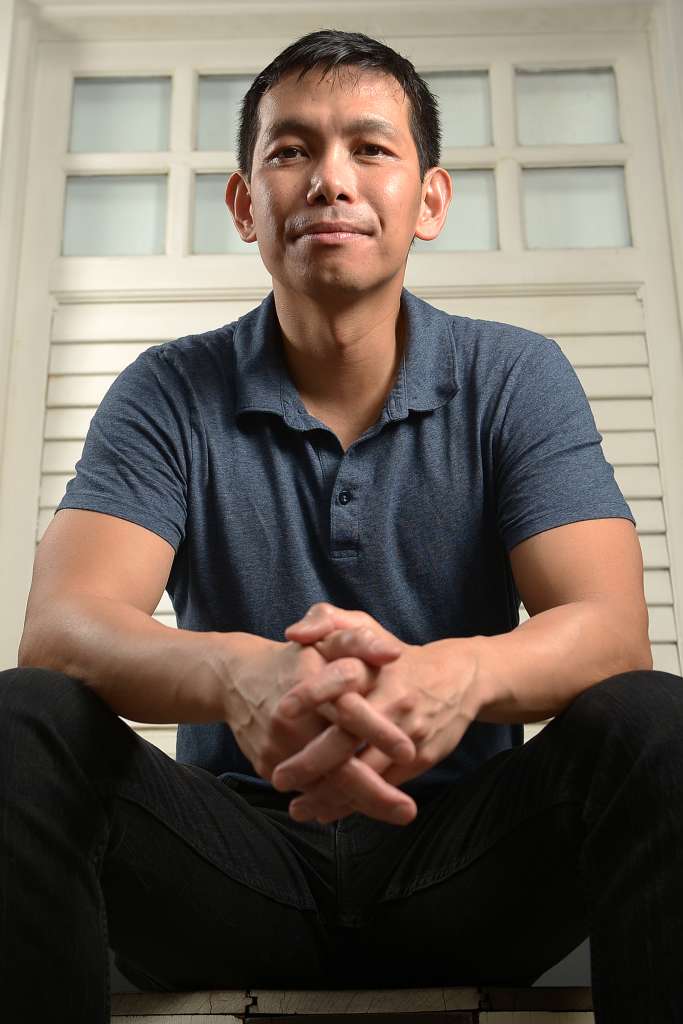Singapore poet calls on artists to 'reconsider engagement with the state and its arts funding'
Sign up now: Get ST's newsletters delivered to your inbox

Singapore poet Jee Leong Koh (above) uploaded a strongly-worded Facebook post today regarding recent comments made by Professor Chan Heng Chee about censorship and arts funding.
ST PHOTO: DESMOND WEE
SINGAPORE - A call by Singapore poet Jee Leong Koh asking artists here to "reconsider engagement with the state and its arts funding" has generated debate in the arts community.
In a strongly-worded Facebook posting uploaded at 9.20am on Monday morning, Koh, who is based in New York, took issue with recent comments made by chairman of the National Arts Council, Professor Chan Heng Chee, who addressed the issue of censorship and arts funding at the Singapore International Film Festival.
Koh said he would no longer work with the arts council, citing examples such as how he withdrew his submission to a poetry anthology that would likely require arts council funding.
In her speech on Nov 26, Prof Chan cited a case in the United States where the Supreme Court upheld advice that the National Endowment of the Arts consider decency and respect for the diverse American values in awarding grants.
This example, she said, demonstrated how the state is often the arbiter of standards, along with society and its subsets. "Standards and values will evolve. Until then, there will be negotiation and compromise," she said.
She noted that while it has been argued that state money is taxpayers' money, "if taxpayers were to have their say, many may argue for money to be spent on welfare subsidies or education and less on the arts".
Koh's book Steep Tea was recently recognised by international daily The Financial Times as one of its Best Poetry works of 2015. Writing on Facebook as well as his Singapore Poetry website, he said that Prof Chan's speech "makes it all too clear that the state after Lee Kuan Yew is bent on controlling the arts through its funding. It will support the arts as a way of promoting the Singapore brand, and neuter the arts as a means of political and social expression".
"[The state] knows that it is the main funder of the arts in Singapore, and that Singapore artists have come to rely on its funding," he wrote. The only way out of this, he added, is to "develop and present our works by using private, overseas or minimal funding".
Koh called on other artists here to join him in "reconsidering engagement with the state and its arts funding... I will say that the state is obliged to cherish the country's artists and art works, even when they are met with public indifference and hostility".
The post has in total drawn over 350 likes and more than 100 shares so far. It has met with mixed views from those in the arts.
Some, such as novelist-playwright Ovidia Yu and musician Ko Sherman, expressed their support. Yu had resigned from the steering committee of last year's Singapore Writers Festival over the National Library Board's removal of three children's books from public libraries. The board had considered pulping the books, over complaints that they were unsuitable for young children.
Others said that while state funding may have its limitations, it does play a role in developing the arts here.
Speaking to The Straits Times, playwright Tan Tarn How said: "It is fallacious to argue that if you don't want to get censored, you should not get government funding. Art is a public good that, like education and health, the government must fund, as part of its role to further the public good and as custodian of the people's money."
Replying to Koh's post, film-maker Jasmine Ng wrote: "Many people have stepped up and have had exchanges over the years across the flux of state arts policymaking, that sometimes moves forward in a one-step-forward-two-steps-back tango. We would be in a much more sorry state of affairs, if those people had given up then."
Former Singapore Art Museum director Kwok Kian Chow wrote: "State funding for the arts is important, especially for those who are just starting out and may find it difficult to seek other sources of funding, just as it is important in the artists' continuing engagement with NAC on the professional structuring of arts funding. Let's work together."
Koh's comments are the latest salvo fired in several weeks of debate on how state funding is allocated to the arts. In a radio interview in October, Ong Keng Sen, artistic director of the Singapore International Festival of Arts, was asked why the state should fund artistic works that go against perceived national values. He responded that state funding is taxpayer money and should not be withheld from dissenting voices, such as artists. The same month, playwright Haresh Sharma, while receiving his Cultural Medallion, had called on audiences to "support our artists unconditionally" in his speech.
In response, the arts council's chief executive officer Kathy Lai, in a commentary published in The Straits Times on Nov 7, argued that the council does its best to support a diversity of artistic expression, but "we will have difficulty funding art with public funds if such works merely feed a desire for self-expression, without any consideration of their impact on the public and whether they truly enrich their lives".
jianxuan@sph.com.sg


